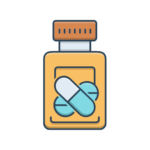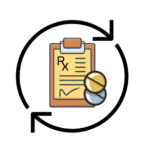Incruse Ellipta (Umeclidinium Bromide)
Medication information written by Dr. Conner Sheehy, PharmD, BCPS
Updated - December 20, 2020
Incruse Ellipta Cost and How to Buy Online
At PricePro Pharmacy we make it simple to order affordable prescription drugs online. To order an Incruse Ellipta inhaler you can place an order online and follow the easy checkout process or call 1-855-776-0079 and speak to a customer service member. We also offer a live chat feature for instant feedback on any questions or assistance with orders.
Please note we do require a prescription for Incruse Ellipta to be submitted in order to process your order. The prescription (Rx) can be faxed, email, uploaded, or we can reach out to your doctor for a copy.
Review the ordering details below and get the cost savings you deserve.

Incruse Ellipta Dosage
The following dosage is available to order:
- Incruse Ellipta 62.5mcg
This inhaler is manufactured by GlaxoSmithKline in Canada and the United Kingdom. There are 30 doses included in each inhaler. Incruse Ellipta inhaler from UK is marketed with he 55mcg dose as each single inhalation provides a delivered dose of 55mcg which is equivalent to 65mcg. This relates to a pre-dispensed dose of 62.5mcg.
The active ingredient in this medication is called Umeclidinium Bromide.

Incruse Ellipta Cost
At PricePro Pharmacy, the low cost of Incruse Ellipta is:
- $88.00 for 30 doses (one inhaler)
- $2.80 per dose for a 90-day supply
In the United States, the average retail Incruse Ellipta price is:
- $425.00 for 1 inhaler
- $14.17 per dose for 3 inhalers
You can save up to 80% when you buy Incruse inhaler with our trusted online pharmacy. There is no need to worry about insurance coverage or manufacturer coupons.
We do encourage for more cost savings to order a 90-day supply of medication compared to 30-days.

Incruse Ellipta Coupon
Currently we do not have a Incruse Ellipta coupon code for additional discounts. However, we love helping our patients save money so for those placing their first order there are special offers available.
New customer coupon codes can be applied at checkout as follows:
- PRICE10 - Save $10 on your first order (minimum $50 order value)
- PRICE20 - Save $20 on your first order (minimum $100 order value)
Please note that these coupon codes are one-time use only for new customers and cannot be combined with other coupons/offers.

Incruse Ellipta Generic
Currently, threre is no generic for Incruse Ellipta available on the market.
Generic drugs are often 60-70% cheaper than their brand name alternative.

Prescription Delivery Times
The estimated shipping time for your order is:
- 7 to 10 business days (Product of Canada)
- 7 to 12 business days (Product of United Kingdom)
The standard shipping cost $9.95 for all orders.
For drugs ordered from Canada, we offer an Express shipping option. The shipping fee is $25 with an estimated delivery time of 3 to 5 business days.
Once you order ships from the licensed pharmacy you will receive an email notification with the applicable shipping details.

Online Prescription Refill
Ordering your refill is very simple. You can login to your online pharmacy account and view your order history and can re-order your medication if you have a valid prescription on file. If your prescription is expired or there is not enough on file then we will need a new prescription. We can reach out to your doctor for a copy.
We also offer friendly refill reminders by email and phone to help notify you of the optimal time to place a refill order. We take into account of the last order placed and estimated delivery times to ensure you won't miss your medication.
Incruse Ellipta (Umeclidinium) Medication Information
Uses
Incruse Ellipta is a prescription inhaler that contains the active ingredient umeclidinium. Your healthcare provider may prescribe it to treat chronic obstructive pulmonary disease (COPD).
COPD is a disease of the lungs and airways. It is a chronic condition where the airways gradually harden over time, and it becomes harder to breathe. Symptoms include shortness of breath, coughing, wheezing, and mucus production.
The medication in Incruse Ellipta is an inhaled anticholinergic. It binds to muscarinic receptors on the smooth muscle in the airways, causing those muscles to relax. If Incruse Ellipta is used every day, it decreases the severity of COPD symptoms.
Dosage
Incruse Ellipta contains 62.5 mcg of umeclidinium.
Inhale the contents of one foil blister strip once daily.
Side Effects
Side effects are relatively uncommon when taking Incruse Ellipta. About 2 in 100 people may experience one of the following side effects:
- Bruising areas of the skin
- Cough
- Fast heartbeat
- Joint pain
- Muscle pain
- Sore throat
- Stomach pain
- Stuffy/runny nose
- Tooth pain
- Upper respiratory infection
Tell your doctor or pharmacist if you have a side effect that worsens your COPD or makes it hard to take your medication.
Precautions
Do not use Incruse Ellipta if you have a milk allergy because the inhalation powder contains whey proteins.
Incruse Ellipta cannot treat bronchospasm. It should not be used in people whose COPD is acutely deteriorating.
Use caution if you have a history of narrow-angle glaucoma because Incruse Ellipta can worsen the condition in certain people.
People with a history of urinary retention may see their symptoms worsen while taking this medication, but this is rare because not a lot of the drug absorbs into the bloodstream. Use caution if you have a history of prostatic hyperplasia or bladder neck obstruction.
If it becomes harder to breathe while using this inhaler, stop taking it and call your doctor.
Interactions
Common drug-drug interactions with Incruse Ellipta include:
- Aclidinium
- Anticholinergic agents
- Glycopyrrolate
- Ipratropium
- Loxapine
- Potassium Chloride
- Pramlintide
- Tiotropium
Storage
The inhaler is packaged in a moisture-protective foil tray with a peelable lid. Once the foil tray is opened, the inhaler is must be discarded after six weeks. Each inhaler contains 30 days of medication.
Store at room temperature between 68°F and 77°F.
Pharmacist Tips
- Incruse Ellipta does not relieve acute symptoms. You should have another prescription for a short-acting inhaler like albuterol to manage acute breathing problems.
- Take Incruse Ellipta every day to see the full effect. It should be inhaled by mouth once daily. It may take a few weeks of continuous use to notice a difference.
- Store Incruse Ellipta away from heat and sources of moisture like the bathroom or kitchen.
Incruse Ellipta FAQs
How do I check how many doses are left in the inhaler?
There is a counter on the side that counts down from 30. Do not use the inhaler once the count reaches 0.
How do I prepare to take a dose?
Open the cover of the inhaler to prepare a dose. Wait to open the cover until you’re ready to take the medication.
How do I take a dose?
Open the cover, exhale away from the mouthpiece, place your lips around the mouthpiece, do not breathe into it, take one long and steady breath, hold your breath for 3 to 4 seconds.
Related Products
References
- Incruse Ellipta [package insert]. Research Triangle Park, NC: GlaxoSmithKline; 2016.

Author: Dr. Conor Sheehy, PharmD, BCPS
Dr. Sheehy is a board-certified pharmacotherapy specialist. He has worked in multiple practice settings, including retail and hospital pharmacies, and in medical clinics. He specializes in anticoagulation, psychiatric medications, and diabetes medications. He strives to empower his patients to understand their medications and improve their overall medical care.
The above information is an educational aid only. It is not intended as medical advice for individual conditions or treatments. Talk to your doctor, nurse or pharmacist before following any medical regimen to see if it is safe and effective for you.



